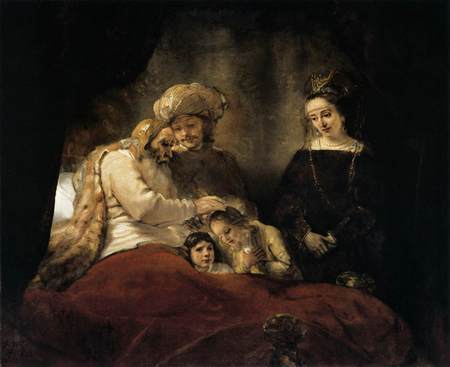When God Asks Us to Change
Rembrandt shows Jacob on his deathbed in Egypt, blessing the sons of Joseph. God was faithful to His promise. Joseph closed his father’s eyes.

Friday of the Fourteenth Week of the Year I
Genesis 46:1-7, 28-30
Psalm 36, 3-4, 18-19, 27-28, 39-40
Matthew 10:16-23
God With Us in Change
In today’s lesson from Genesis God reassures Jacob, who is about to make an enormous change in his life. Who among us is not resistant to change? We cling to our little securities. We are possessive and territorial: quick to say “my” and “mine” where the saints were quick to say “thy” and “thine.” We require change of others but bristle when asked to change ourselves.
Salutary Change
Uprootings and detachments are never easy, but they are salutary. People who emigrate are obliged to leave many things behind. They are compelled to learn new ways of being, of relating, and of doing. More often than not they are obliged to learn a new language. God knows that for us change can be a frightening thing. This is why He intervened, calling Jacob by name “in visions of the night.” (Gen 46:2).
Night
In Sacred Scripture, the night evokes a number of things. It is the obscurity in which faith is put to the test. It is the darkness in which one learns to hope for the dawn. God speaks, more often than not, during the hours of the night. He covers His most luminous works with night’s darkling veil: the Exodus, the institution of the Most Holy Eucharist, and the resurrection. “If I say, ‘Let only darkness cover me, and the light about me be night,’ even the darkness is not dark to Thee, the night is bright as the day; for darkness is as light with Thee” (Ps 138:11-12).
God Hides and Speaks
The saints and mystics of every age learned, under the guidance of the Holy Spirit, to cherish the night. We see this in Saint Gregory Nazianzen, and in the author of The Cloud of Unknowing; we see it in Saint John of the Cross, in Saint Thérèse of the Child Jesus, and in the Venerable John Henry Cardinal Newman. The same God who hides himself in the dark night of faith, visits us by night to comfort us and to speak His secrets to our hearts.
Fear Not
“God spoke to Jacob in visions of the night, and said, ‘Jacob, Jacob.’ And he said, ‘Here am I’” (Gen 46:2). Ecce adsum. “God said to him, ‘I am the most mighty God of thy father — fortissimus Deus patris tuis — fear not, go down into Egypt, for I will make a great nation of thee.” Fear not. Noli timere. God, you see, knows that change is not easy for us. He knows that we, out of a combination of the love of comfort, the lull of routine, and the fear of the unknown, are not easily convinced to get up and go anywhere, let alone “down to Egypt.”
I Will Go Down With Thee
And so God, speaking as the most loving of fathers, adds: “I will go down with thee thither, and will bring thee back again from thence” (Gen 46:4). Then He addresses one of Jacob’s deepest fears: that of dying alone, without the comforting presence of a son to close his eyes. And so, God says, “Joseph also — the favourite son — shall put his hands upon thy eyes” (Gen 46:4).
Trust in Him
The Responsorial Psalm (36) is a practical instruction on surrender to the designs of God or, if you will, on abandonment to Divine Providence:
Trust in the Lord, and do good,
and dwell in the land, and thou shalt be fed with its riches.
Delight in the Lord,
and He will give thee the petitions of thy heart.
Commit thy way to the Lord,
and trust in Him, and He will do it (Ps 36:3-5).
In My Very Confidence Lies My Hope
When the fear of change comes upon us we need to pray Psalm 36. We need to repeat the promises of God to one who trusts absolutely in Him. Perhaps too, we need to pray the prayer of that great friend of the Sacred Heart, Saint Claude La Colombière:
My God, I believe most firmly
that Thou watchest over all who hope in Thee,
and that we can want for nothing
when we rely upon Thee in all things;
therefore I am resolved for the future to have no anxieties,
and to cast all my cares upon Thee.
People may deprive me of worldly goods and of honors;
sickness may take from me my strength
and the means of serving Thee;
I may even lose Thy grace by sin;
but my trust shall never leave me.
I will preserve it to the last moment of my life,
and the powers of hell shall seek in vain to wrestle it from me.
Let others seek happiness in their wealth, in their talents;
let them trust to the purity of their lives,
the severity of their mortifications,
to the number of their good works, the fervor of their prayers;
as for me, O my God, in my very confidence lies all my hope.
”For Thou, O Lord, singularly has settled me in hope.”
This confidence can never be in vain.
”No one has hoped in the Lord and has been confounded.”

+Dear Father,
How true-it is painful to let go when God asks for change. Ah, but it is Love that asks, and so we seek to trust. I love the quote of Dom Marmion: “Ask for nothing, refuse nothing, desire nothing, except what God desires for thee. One thing only is necessary-it is He.” I wonder with loving interest if this is your personal experience at present? You are in our prayers.